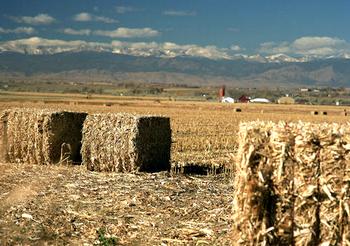 美國總統歐巴馬擬增加全國再生燃料生產,轉化生質物(biomass)為生質能,捕捉並儲存煤炭火力電廠所製造的溫室氣體。與此同時,政府發表生質燃料跨部會工作小組的首篇報告,顯示出美國將無法達到2007年「能源自主與安全法」設定的生質燃料生產目標。
美國總統歐巴馬擬增加全國再生燃料生產,轉化生質物(biomass)為生質能,捕捉並儲存煤炭火力電廠所製造的溫室氣體。與此同時,政府發表生質燃料跨部會工作小組的首篇報告,顯示出美國將無法達到2007年「能源自主與安全法」設定的生質燃料生產目標。
歐巴馬3日於白宮會晤兩黨州長時宣佈三項措施,將同步促進生質燃料生產,降低美國對外國石油的依賴,追求新興產業並創造百萬就業。
歐巴馬表示,美國將毋須等候國會通過乾淨能源與氣候法案,便能自這些措施步驟中獲益。眾議院於2009年6月通過這項法案,即維克曼-瑪肯法案(Waxman-Markey),但此一法案目前仍於參議院等候議決。
歐巴馬3日宣布的三項能源措施,至少跨越9個聯邦部會,並預期在財政上對農村經濟有所裨益。
一、再生燃料標準:環保署已通過一項法規,落實國會立法通過的長期再生燃料強制規定,亦即在2022年前達到360億加侖。再生燃料標準規定生質燃料之產量須自2009年的111億加侖增長至2022年360億加侖,其中210億加侖須來自新一代生質燃料(advanced biofuels)。此新法規請參閱此。
二、碳捕捉與儲存跨部會行動小組:歐巴馬總統發表備忘錄,成立此一小組,以加速發展推廣較為潔淨的碳技術,亦即控制溫室氣體二氧化碳排放。此行動小組須在180天內提出計劃以克服障礙,在10年內獲致可做得到的碳捕捉與儲存技術,目標為2016年前要有5-10個商業示範計畫投入運作。備忘錄請參閱此。
三、生質物作物協助方案(Biomass Crop Assistance Program):美國農業部在此方案中提出一項新規定,以將生質能轉化為生質能與生質基質產品(bio-based product)。農業部則對未來生質燃料與再生能源的商業化提供補助、貸款或其它金融支持。此農業部規定請參閱此。
2009年5月,總統歐巴馬成立生質燃料跨部會工作小組以發展全面性策略,加速美國生質燃料的投資與生產,減少對化石燃料的依賴。該工作小組3日發表其首次報告「讓美國燃料成長」,乃為美國政府達成或超越國家生質燃料目標的策略。報告全文請點閱此。
報告說明:「美國每年生產120億加侖的生質燃料,多數由玉米乙醇製成,然而我們目前的進度將無法達到國會要求的2022年前每年360億加侖或2010年時1億加侖纖維性生質燃料的目標。」
報告歸咎於全球經濟衰退,導致缺乏足夠的進展。報告說:「對於私部門生質燃料新生產計畫的資金挹注與投資,經濟衰退已築起明顯的障礙。」
預期新一代的生質燃料將會是21世界美國最重要的產業之一,此報告發現,許多在試驗規模有發展性的新一代生質燃料原料與製程技術,正開始要進入擴大規模的階段。
President Barack Obama has moved to increase America's renewable fuels production, turn biomass into bioenergy, and capture and store the greenhouse gases produced by coal-burning power plants. At the same time, the administration released the first report of the Biofuels Interagency Working Group showing that the country is falling short of biofuel production targets mandated by the Energy Independence and Security Act of 2007.
At a meeting with a bipartisan group of governors at the White House Wednesday, the President said these three measures will work in tandem to boost biofuels production, reduce America's dependence on foreign oil, foster new industries and create millions of jobs.
President Obama said the country will benefit from taking these steps now without waiting for Congress to pass a clean energy and climate bill. The House of Representatives passed its bill, the Waxman-Markey bill, last June, but a companion bill is still pending in the Senate.
The three energy measures Obama announced Wednesday span at least nine federal agencies and offices and are expected to benefit rural economies financially.
1. Renewable Fuels Standard: The U.S. EPA has finalized a rule implementing the long-term renewable fuels mandate of 36 billion gallons by 2022 established by Congress. The Renewable Fuels Standard requires biofuels production to grow from last year's 11.1 billion gallons to 36 billion gallons in 2022, with 21 billion gallons to come from advanced biofuels.
2. Interagency Task Force on Carbon Capture and Storage: President Obama issued a Memorandum establishing an Interagency Task Force on Carbon Capture and Storage, CCS, to speed the development and deployment of cleaner coal technologies by controlling emissions of the greenhouse gas carbon dioxide. The Task Force has 180 days to develop a plan to overcome the barriers to affordable CCS within 10 years, with a goal of bringing five to 10 commercial demonstration projects on line by 2016.
3. Biomass Crop Assistance Program: The U.S. Department of Agriculture has proposed a rule for Biomass Crop Assistance Program to convert biomass to bioenergy and bio-based products. USDA provides grants, loans and other financial support to further biofuels and renewable energy commercialization. Click here to read the USDA rule:
Last May, President Obama established the Biofuels Interagency Working Group to develop a comprehensive approach to accelerating the investment in and production of American biofuels and reducing dependence on fossil fuels. On Wednesday, the Working Group released its first report, "Growing America's Fuel," a new U.S. Government strategy for meeting or beating the country's biofuel targets. Click here to read the full report:
The report states, "The U.S. is producing 12 billion gallons per year of biofuels, mostly from corn grain ethanol, but we are not on a trajectory to reach the Congressional 36 billion gallons per year goal by 2022 or to meet the 100 million gallons cellulosic biofuels target in 2010."
The report blames the global economic downturn for the lack of sufficient progress, saying, "The recession has raised significant barriers to private sector capital financing and investment in new biofuels production."
Predicting that advanced next generation biofuels will be one of the most important U.S. industries in the 21st century, the report finds that many next generation biofuels feedstock and process technologies that are promising at bench scale are just beginning to be developed through the scale-up process.
全文及圖片詳見:ENS



